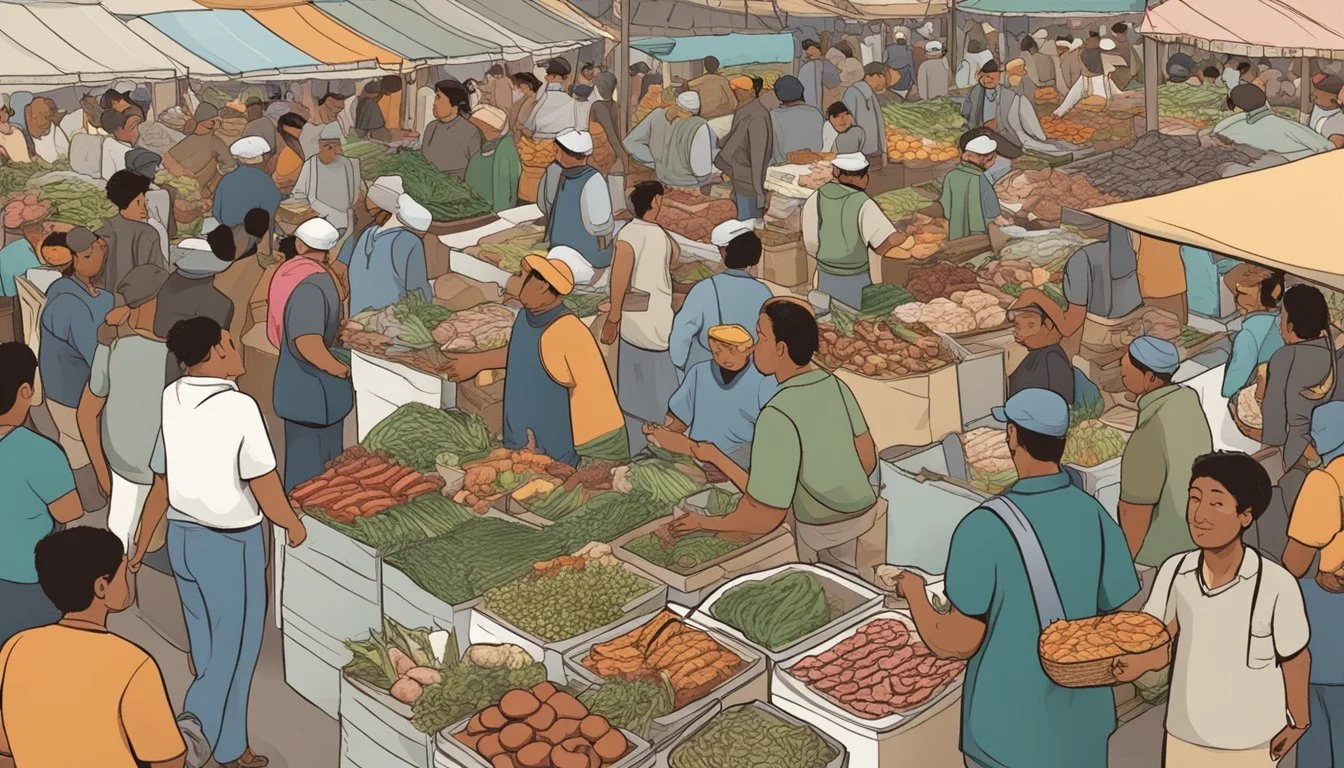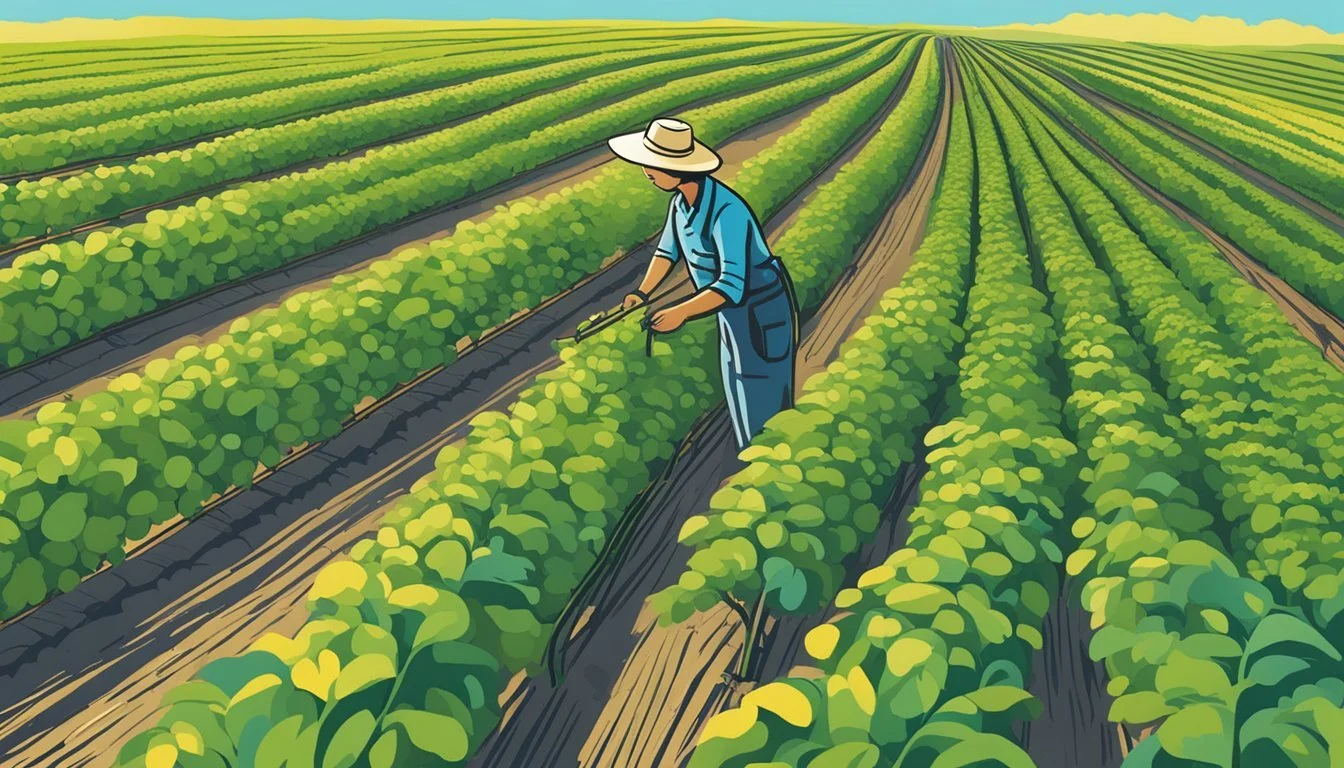7 Eye-Opening Documentaries on Food Fraud and Counterfeit Products
Exposing Industry Deceptions
Documentaries have the power to unveil hidden truths and shed light on pressing issues that affect our daily lives. A subset of these films focuses on exposing fraud and deception in the food industry and consumer goods market, revealing the dark underbelly of global trade and production.
These eye-opening documentaries serve as a wake-up call for consumers, highlighting the prevalence of food fraud and counterfeit products in today's marketplace. By delving into topics such as honey laundering, fake pharmaceuticals, and counterfeit fashion items, these films raise awareness about the potential risks associated with seemingly innocuous purchases. Viewers gain valuable insights into the complex web of deception that spans across various industries and continents.
1) "The Truth About 'Organic' Foods" by FoodInc Films
This documentary explores the complexities behind organic food labeling and production. It investigates whether organic foods truly live up to consumer expectations.
The film examines the practices of large-scale organic farms and compares them to conventional farming methods. It reveals surprising similarities between some organic and non-organic production techniques.
Interviews with farmers, industry experts, and regulatory officials provide diverse perspectives on organic certification standards. The documentary scrutinizes loopholes in organic regulations that allow certain synthetic substances to be used.
Viewers learn about the challenges small organic farmers face in competing with large corporations entering the organic market. The film also addresses the environmental impact of organic farming on a global scale.
"The Truth About 'Organic' Foods" raises questions about the integrity of the organic food industry. It encourages consumers to look beyond labels and consider the broader implications of their food choices.
2) 'Rotten' Series by Netflix
'Rotten' is an investigative documentary series produced by Netflix that examines corruption and deception in the global food industry. The show premiered its first season in 2018, followed by a second season in 2019.
Each episode of 'Rotten' focuses on a different aspect of food production and distribution. The series covers a wide range of topics, from honey adulteration to garlic trade controversies.
One episode explores the poultry industry, highlighting the challenges faced by farmers like Sonny from Vietnam. It reveals how bird flu outbreaks can lead to massive financial losses for growers.
The documentary series is known for its unbiased approach, featuring interviews with experts and industry insiders. It provides viewers with a comprehensive look at the complexities of the food supply chain.
'Rotten' exposes fraudulent practices and their consequences on consumer health. It sheds light on issues that many people may be unaware of when purchasing everyday food items.
The series serves as an eye-opening exploration of the hidden aspects of food production. It encourages viewers to think critically about the origins and quality of the food they consume.
3) 'Fed Up' directed by Stephanie Soechtig
'Fed Up' is a 2014 documentary that examines America's obesity epidemic and the food industry's role in exacerbating it. Directed by Stephanie Soechtig and narrated by Katie Couric, the film takes a critical look at the modern food landscape.
The documentary explores how food companies use deceptive marketing tactics, particularly targeting children. It highlights the prevalence of added sugar in processed foods and its potential health impacts.
'Fed Up' features interviews with experts like Michael Pollan and former President Bill Clinton. It also includes personal stories of families struggling with obesity and related health issues.
The film argues that the food industry prioritizes profits over public health. It criticizes government policies that seemingly favor big food companies over consumers' wellbeing.
Soechtig's documentary aims to educate viewers about hidden sugars in everyday foods. It challenges common misconceptions about diet and exercise in relation to weight management.
'Fed Up' received positive reviews for its informative approach to a complex issue. Critics praised its ability to present scientific information in an accessible manner for general audiences.
4) 'Food, Inc.' directed by Robert Kenner
'Food, Inc.' is a documentary that examines the American food industry. Directed by Robert Kenner and released in 2008, the film explores how large corporations control food production in the United States.
The documentary features insights from authors Eric Schlosser and Michael Pollan. It sheds light on industrial farming practices and their impact on consumer health, worker safety, and the environment.
'Food, Inc.' reveals the mechanized processes behind food production that are often hidden from consumers. It argues that these methods prioritize profits over other concerns.
The film examines various aspects of the food industry, including meat production, crop cultivation, and food processing. It raises questions about the sustainability and ethics of current practices.
'Food, Inc.' received critical acclaim for its eye-opening portrayal of the food industry. It aimed to educate viewers about the origins of their food and the implications of industrial farming methods.
The documentary encourages viewers to consider the broader impacts of their food choices. It presents information about alternative farming practices and consumer options.
5) 'Forks Over Knives' by Lee Fulkerson
'Forks Over Knives' is a 2011 documentary directed by Lee Fulkerson. The film explores the connection between diet and chronic diseases, advocating for a whole-food, plant-based diet.
Fulkerson's documentary features the work of Dr. T. Colin Campbell and Dr. Caldwell Esselstyn. These researchers present evidence linking animal products and processed foods to various health issues.
The film showcases personal stories of individuals who have experienced health improvements after adopting a plant-based diet. It argues that such dietary changes can prevent and even reverse certain chronic conditions.
'Forks Over Knives' examines the potential health benefits of eliminating animal products and processed foods from one's diet. It presents scientific research and expert opinions to support its claims.
The documentary has gained significant attention since its release. It has influenced many viewers to reconsider their dietary choices and explore plant-based eating.
6) 'Sugar Coated' directed by Michèle Hozer
'Sugar Coated' is a 2015 Canadian documentary that explores the impact of excessive sugar consumption on global health. Director Michèle Hozer investigates how the food industry has influenced public perception of sugar.
The film examines the tactics used by the sugar industry to deflect health concerns. It reveals a secret PR campaign from the 1970s aimed at shifting attention away from sugar's potential risks.
Hozer's documentary features interviews with experts like Gary Taubes and Robert Lustig. These professionals provide insights into the science behind sugar's effects on the human body.
'Sugar Coated' premiered at the Hot Docs Canadian International Documentary Festival. It later screened at other events, including the DOXA Documentary Film Festival.
The film aims to educate viewers about the prevalence of sugar in modern diets. It highlights how sugar has been added to numerous food products, often without consumers' awareness.
Through its exploration of industry practices and health impacts, 'Sugar Coated' encourages viewers to reconsider their sugar intake. It serves as a thought-provoking look at a ubiquitous ingredient in the global food supply.
7) 'Cowspiracy' by Kip Andersen
'Cowspiracy: The Sustainability Secret' is a thought-provoking documentary directed by Kip Andersen. Released in 2014, the film explores the environmental impact of animal agriculture.
Andersen investigates why leading environmental organizations seem reluctant to address this issue. The documentary presents startling facts about the effects of livestock farming on deforestation, water consumption, and greenhouse gas emissions.
Through interviews with experts and activists, 'Cowspiracy' challenges viewers to reconsider their dietary choices. The film suggests that animal agriculture is a major contributor to climate change and environmental degradation.
'Cowspiracy' uses visual aids like graphs and cartoons to present complex information in an accessible manner. It aims to raise awareness about the connection between food choices and sustainability.
The documentary has garnered both praise and criticism for its approach to environmental issues. It encourages viewers to think critically about the environmental consequences of their food consumption.
Understanding Food Fraud
Food fraud encompasses deliberate acts of adulterating, mislabeling, or misrepresenting food products for economic gain. This deceptive practice has existed throughout history and continues to impact the global food supply chain today.
Defining Food Fraud
Food fraud refers to the intentional substitution, addition, tampering, or misrepresentation of food, food ingredients, or food packaging for economic advantage. Common types include:
Adulteration: Adding inferior ingredients to increase profits
Mislabeling: False claims about origin, quality, or ingredients
Counterfeiting: Producing fake versions of known brands
Substitution: Replacing ingredients with cheaper alternatives
These practices not only deceive consumers but can also pose serious health risks.
Historical Perspective
Food fraud has a long history dating back centuries. In ancient Rome, unscrupulous merchants diluted wine with water and added lead to enhance flavor.
During the Industrial Revolution, food adulteration became widespread. Common practices included:
Adding chalk to flour
Coloring tea leaves with copper
Diluting milk with water
The publication of Upton Sinclair's "The Jungle" in 1906 exposed unsanitary conditions in the U.S. meat industry, leading to the Pure Food and Drug Act. This landmark legislation marked the beginning of modern food safety regulations.
Today, advanced technology and global supply chains have created new opportunities for food fraud, making detection and prevention ongoing challenges.
Counterfeit Products in the Food Industry
Food fraud and counterfeiting pose serious risks to consumer health and the integrity of the global food supply chain. Unscrupulous actors employ various deceptive practices to maximize profits at the expense of safety and quality.
Common Methods of Counterfeiting
Dilution is a widespread technique used to stretch products. Fraudsters may add water to milk or juice to increase volume. Substitution involves swapping high-value ingredients with cheaper alternatives. For example, replacing extra virgin olive oil with lower-grade oils.
Mislabeling allows counterfeiters to sell ordinary products as premium goods. They might falsely claim products are organic, free-range, or from a specific origin. Some criminals create entirely fake versions of popular foods using artificial ingredients and flavorings.
Expired foods are sometimes repackaged with new dates. This dangerous practice puts consumers at risk of foodborne illness. Counterfeiting also extends to packaging, with fake versions of well-known brands flooding some markets.
Impact on Consumers and Manufacturers
Counterfeit foods can cause severe health issues. Unlisted ingredients may trigger allergic reactions or interact with medications. Toxic additives and contaminants pose even greater dangers. Consumers often pay premium prices for substandard or fake products, eroding trust in brands and retailers.
For legitimate manufacturers, counterfeiting leads to lost revenue and reputational damage. Companies invest heavily in protecting their supply chains and developing anti-counterfeiting technologies. These measures increase costs, which are often passed on to consumers.
Food fraud undermines fair competition in the marketplace. It creates an uneven playing field where honest producers struggle to compete with those cutting corners. This can drive smaller companies out of business and reduce consumer choice.
Regulations and Enforcement
Combating food fraud and counterfeit products requires robust legal frameworks and enforcement mechanisms. Governments and international bodies have implemented various measures to protect consumers and maintain food supply integrity.
Global and Local Frameworks
The Codex Alimentarius, established by the FAO and WHO, sets international food standards to ensure safety and fair trade practices. Many countries have adopted these guidelines into national legislation. The European Union's Food Fraud Network facilitates cross-border cooperation in tackling food fraud cases.
In the United States, the FDA Food Safety Modernization Act strengthens food safety measures and grants the agency more authority to combat fraud. China has implemented a food traceability system to track products from farm to table.
Challenges in Regulation
Enforcing regulations across complex global supply chains presents significant hurdles. Limited resources and jurisdictional issues often hamper investigations into international food fraud cases.
Rapidly evolving fraud techniques outpace regulatory updates, creating gaps in enforcement. The rise of e-commerce has further complicated oversight, as online marketplaces can be difficult to monitor effectively.
Harmonizing standards across different countries remains an ongoing challenge. Disparities in regulatory frameworks can create loopholes that fraudsters exploit to evade detection and prosecution.



